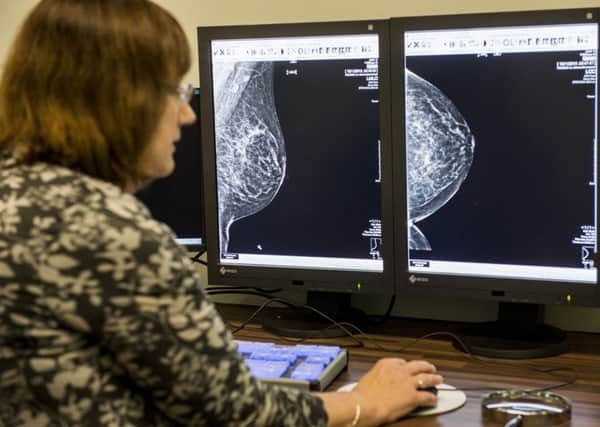Breast cancer eradicated with public’s support


Breast cancer is the most common cancer in the UK – this year, more than 4,600 women in Scotland will be told that they have the disease, and 1,000 women will lose their lives to it.
Breast cancer touches the lives of millions of us, and for every person who develops the disease, there are families, friends and loved ones who also feel the fear and uncertainty that comes with it. Survival rates for breast cancer have increased dramatically – more than four out of five women who develop breast cancer will now live beyond five years. However, more and more women are developing the disease – there are nearly 700,000 people living with or after a breast cancer diagnosis in the UK.
Advertisement
Hide AdAdvertisement
Hide AdThat’s why we launched Breast Cancer Now in June, with the bold ambition to stop women dying from breast cancer by 2050. We are the newest and largest breast cancer charity working in Scotland and we currently invest £1.6 million in research, funding nine projects across the country.
We believe that if we act now, then our aim to stop women dying of breast cancer by 2050 is achievable.
We’ve already identified effective ways to prevent breast cancer, such as surgery, drugs and changes to lifestyle. Now it’s about tailoring that knowledge further and finding the right way to help each individual manage their personal risk of the disease.
We know that finding breast cancer early gives women the best chance of survival, and we have developed simple health messages to support that aim. We need to encourage everyone to be breast aware, ensure that the screening programme works as effectively as possible and find new ways to detect the disease earlier.
The way breast cancer is treated has been revolutionised through the discovery of targeted drugs with fewer side effects and improved surgery and radiotherapy options. The next step is to find treatments that work for every type of breast cancer, particularly those where treatment options are currently limited.
Most importantly, Breast Cancer Now refuses to ignore secondary breast cancer. Now is the time to find new ways to stop the disease, with treatments that give women back the time that secondary breast cancer steals.
Despite huge advances in treatments, the UK still has one of the lowest breast cancer survival rates in Western Europe. Existing treatments can control the disease for a time, but it will eventually stop responding and ultimately lead to death.
Scientists in Dundee, Edinburgh and Glasgow are currently carrying out research to develop new treatments, as well as to improve existing ones, and working out which treatments are most suitable for which patients.
Advertisement
Hide AdAdvertisement
Hide AdIn addition, we have announced a study to analyse tissue from secondary breast cancer patients, which will open the door to understanding and ultimately stopping the spread of the disease in a way never before seen in the UK.
The Breast Cancer Now Legacy Study for Secondary Breast Cancer, sponsored by the Royal Marsden NHS Foundation Trust and the Institute of Cancer Research, London, allows patients with secondary breast cancer to donate tissue for research shortly after death.
The study relies on accessing secondary tissue quickly, to maintain the integrity of key molecules in the tumours, and to create cell models of breast cancer metastases.
By studying the cells while they are still alive, researchers hope they will better understand how some cancer cells can break away from the primary tumour in the breast, travel through the bloodstream and form new tumours at different sites. Understanding these mechanisms will be crucial in halting the progression of the disease.
Studies such as Legacy provide researchers with the best opportunity to understand secondary breast cancer, how it works, and how to stop it.
We want to create a world where we can control breast cancer; a world where women will live with the disease but never die from it. If we act now we believe that, by 2050, this can be a reality. But we can only realise this with the support of people right across Scotland.
• Baroness Delyth Morgan is Breast Cancer Now’s chief executive officer www.breastcancernow.org